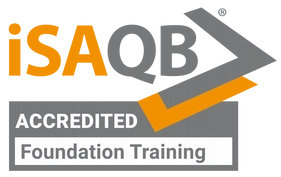30-02 Apr - May 2024
GMT +02:00
-
Tue - Thu
- 08:30 - 17:30
Seats
2 left
Guaranteed
With the Foundation Level Certification (CPSA-F), you will learn the skills and gain the necessary knowledge to successfully design and document software architectures. The aim of the training is that, this knowledge can be used by software architects as a foundation or template to implementations.
Also, our CPSA-F Training is an internationally recognized educational standard in software architecture. It includes many benefits for the professional development of the participant.

GMT +02:00
Seats
2 left
Guaranteed
GMT +02:00
Seats
5+ left
1943,00
1651,00
Guaranteed
GMT +02:00
Fully Booked
GMT +02:00
Fully Booked
GMT +02:00
Fully Booked
GMT +02:00
Seats
4 left
GMT +02:00
Fully Booked
GMT +02:00
Seats
5+ left
2364,00
2128,00
The Foundation Level Certification (CPSA-F) gives you the knowledge and skills necessary for successful design and documentation of software architectures. The aim of the training is that software architectures can be used by software architects as a basis or template for implementations.
The CPSA Foundation Level certification is a valuable seal of quality that is an internationally recognized training standard in software architecture. The certification includes many benefits for the professional development of the participants.
Today, software systems are becoming increasingly complex and the demands on IT solutions are increasing among producers and users. The cost and time pressure on software projects is also increasing, while at the same time the complexity in the environment is increasing. The smart software architectures are therefore an important success factor. As a practicing software architect or advanced developer, you need to be familiar with the basics.
Visit our iSAQB Certifications Overview page to gain a comprehensive understanding.
We are here for "you", that means we are fully adjustable according to your needs.
Our training courses are offered online and on-site courses. There is also the option for in-house training. So you can conveniently choose what works best for you.
Our 3-day Certified Professional for Software Architecture Foundation Level training is highly interactive and provides you with practical, intense and definitely a pragmatic introduction to software architecture. The focus is on a systematic and methodical process of architecture design and architecture assessment.
You will learn the methodological tools of successful architects. We ensure through a guided course preparation that the participants so you can concentrate mainly on individual and practical situations during the course days.
Our CPSA-F success rate is 98.8% of all course participants. These course participants have successfully completed the CPSA-F Certification Exam after attending a course with us. We prepare you as good as possible for the certification exam!
"Certified Professional for Software Architecture - Foundation Level" will teach you:
The abilities you will gain are:
The curriculum consists of five strongly interrelated parts – based upon solid and proven terminology. a (free!) glossary will also be provided. about 40 different learning objectives structure the required skills and knowledge of software architecture in a practical and pragmatic way.
At the end of the training you will have an exam for certification. The exam is carried by an international accreditation authority. If you pass the exam, you will receive the certificate directly from the certification agency.
Visit the official iSAQB® Website for detailed information about the certification.
Would you like to register for iSAQB® - Certified Professional for Software Architecture Foundation Training Course?
AnmeldenIch hatte die Möglichkeit an einer Online iSAQB CPSA-F Schulung von tectrain teilzunehmen. Ich war vom Training und vom ganzen Ablauf sehr positiv beeindruckt. Das Training war wirklich gut strukturiert, der Trainer konnte alle unsere Fragen beantworten und während der drei Schulungstagen alles sehr interessant halten. Ich kann dieses iSAQB-Training absolut weiterempfehlen!
I. Marcu
Senior Software Developer | Bedag Informatik AGTell us what we can do better next time.

